In April 1804, trader Lewis Crawford was asked by Meriwether Lewis to be a diplomatic envoy to the Iowas and Yanktonai Sioux. Lewis gave Crawford a “parole and speech” and blank Indian vocabulary forms, which were crucial tools for facilitating communication and understanding Americans and the Native tribes. Crawford was also tasked with sending a representative delegation of Indians—limited to twelve from each nation—to Washington City via St. Louis.[1]Lewis to Amos Stoddard, 16 May 1804, Amos Stoddard to Henry Dearborn, 3 June 1804 in Letters of the Lewis and Clark Expedition with Related Documents: 1783-1854, 2nd ed., ed. Donald Jackson (Urbana: … Continue reading
Because the Lewis and Clark expedition did not expect to encounter Iowas and Yanktonai Sioux on their journey up the Missouri River, they relied on Crawford to act on their behalf. This mission was part of a broader strategy to establish peaceful relations and secure alliances with the Native American tribes, which were considered essential for the broader success of the United States’ expansion into the newly acquired Louisiana Territory.[2]For more, see on this site Trail Diplomacy.
The Iowa vocabulary was received by Amos Stoddard October 1804 and forwarded to President Jefferson. In March 1805, the Yanktonai vocabulary arrived along with a delegation of Sioux chiefs from the Des Moines River. When they found out that they could not leave for Washington City until May, they decided to return home.[3]Amos Stoddard to Thomas Jefferson, 19 October 1804, Stoddard to Jefferson, 24 March 1805 in Letters, 212–13; 221. These efforts exemplified the complex and delicate nature of early American diplomacy and the significant role of intermediaries like Crawford in navigating the cultural and political landscapes of the American frontier.
Related Pages
April 4, 1804
Packing provisions
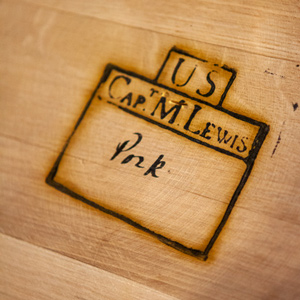

At camp across from the mouth of the Missouri, Clark has corn, salted pork, flour, and other provisions packed. He also writes a speech for the Iowa Nation to be delivered by trader Lewis Crawford.
April 5, 1804
A speech for the Iowas
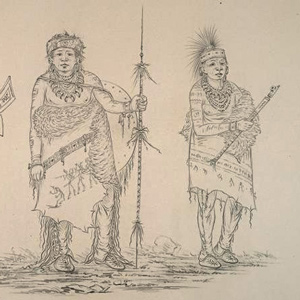

At Camp River Dubois, Clark and Lewis write speeches for the Iowa and Yanktonai People. They send the speeches—along with Jefferson’s questions, vocabulary, and invitation to visit Washington City.
April 6, 1804
Tomahawks and knives
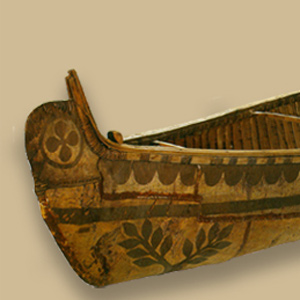

A birch bark canoe bound for the Mackinac post sets out from the expedition’s winter camp at the Wood River. Clark distributes knives and tomahawks, and in the evening, it snows for a short time.
May 16, 1804
St. Charles arrival
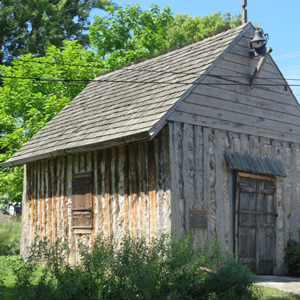

The boats set out early, pass the coal beds of Charbonier Bluff, and reach St. Charles, an early French settlement on the Missouri River. Many citizens come out to see the event and socialization commences.
October 29, 1804
Mandan and Hidatsa council
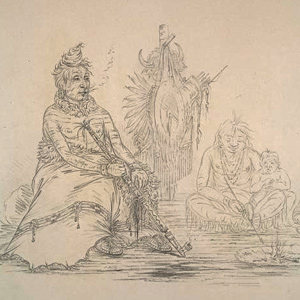

Opposite the Knife River, Mandan and Hidatsa chiefs come from each village to council with the captains. A long speech is given, and the captains ask them to smoke the pipe of peace with an Arikara chief.
March 24, 1805
Bird cages


At Fort Mandan, cages are made for the live birds that will soon be sent to Washington City. In St. Louis, Capt. Amos Stoddard updates President Thomas Jefferson regarding Lewis’s delegation of Iowas.
Notes
| ↑1 | Lewis to Amos Stoddard, 16 May 1804, Amos Stoddard to Henry Dearborn, 3 June 1804 in Letters of the Lewis and Clark Expedition with Related Documents: 1783-1854, 2nd ed., ed. Donald Jackson (Urbana: University of Illinois Press, 1978), 196; 189–90. |
|---|---|
| ↑2 | For more, see on this site Trail Diplomacy. |
| ↑3 | Amos Stoddard to Thomas Jefferson, 19 October 1804, Stoddard to Jefferson, 24 March 1805 in Letters, 212–13; 221. |
Experience the Lewis and Clark Trail
The Lewis and Clark Trail Experience—our sister site at lewisandclark.travel—connects the world to people and places on the Lewis and Clark Trail.
Discover More
- The Lewis and Clark Expedition: Day by Day by Gary E. Moulton (University of Nebraska Press, 2018). The story in prose, 14 May 1804–23 September 1806.
- The Lewis and Clark Journals: An American Epic of Discovery (abridged) by Gary E. Moulton (University of Nebraska Press, 2003). Selected journal excerpts, 14 May 1804–23 September 1806.
- The Lewis and Clark Journals. by Gary E. Moulton (University of Nebraska Press, 1983–2001). The complete story in 13 volumes.

